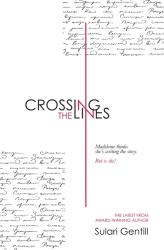"In the beginning she was a thought so unformed that he was aware only of something which once was not."
Edward McGinnity is a successful novelist who wants to write a novel about a crime writer. His character’s name is Madeleine d’Leon, a writer of the popular period crime novels. Madeleine wants to write a modern crime novel. Her novel’s character is also a writer.
"She called him Edward McGinnity. His friends would call him Ned."
Sounds simple so far, it’s not. Crossing The Lines is a work of Meta Fiction and the characters of Edward McGinnity and Madeleine d’Leon are both real and imagined. Not only are they writing crime novels, they are also characters in each other’s crime novels. As Crossing The Lines progresses the barriers between each writer and their character become blurred, they cross into each other’s lives, they question, advise and finally become attached to each other, if I was to say any more it would spoil the fun.
In her acceptance speech after Crossing The Lines won the 2018 Ned Kelly Award for Best Australian Crime novel Sulari Gentill said “Crossing the Lines is in many ways my love letter to writing, to a writer's life with all its highs and lows, its absurdities and privileges. This is very definitely a high and a privilege. To everybody who took a chance on this strange little book, thank you with all of my heart”.
Crossing The Lines is more than a ‘strange little book’, it’s a wonderful journey into the mind and life of a writer with Sulari Gentill as an excellent guide to take you there.
Crossing the Lines

A successful writer, Madeleine, creates a character, Edward, and begins to imagine his life. He, too, is an author. Edward is in love with a woman, Willow, who's married to a man Edward loathes, and who loathes him, but he and Willow stay close friends. She's an artist. As Madeleine develops the plot, Edward attends a gallery show where a scummy critic is flung down a flight of fire stairs...murdered. Madeleine, still stressed from her miscarriages and grieving her inability to have a child, grows more and more enamored of Edward, spending more and more time with him and the progress of the investigation and less with her physician husband, Hugh, who in turn may be developing secrets of his own.
As Madeline engages more with Edward, he begins to engage back. A crisis comes when Madeleine chooses the killer in Edward's story and Hugh begins to question her immersion in her novel. Yet Crossing the Lines is not about collecting clues and solving crimes. Rather it's about the process of creation, a gradual undermining of the authority of the author as the act of writing spirals away and merges with the story being told, a self-referring narrative crossing over boundaries leaving in question who to trust, and who and what is true.
Add comment